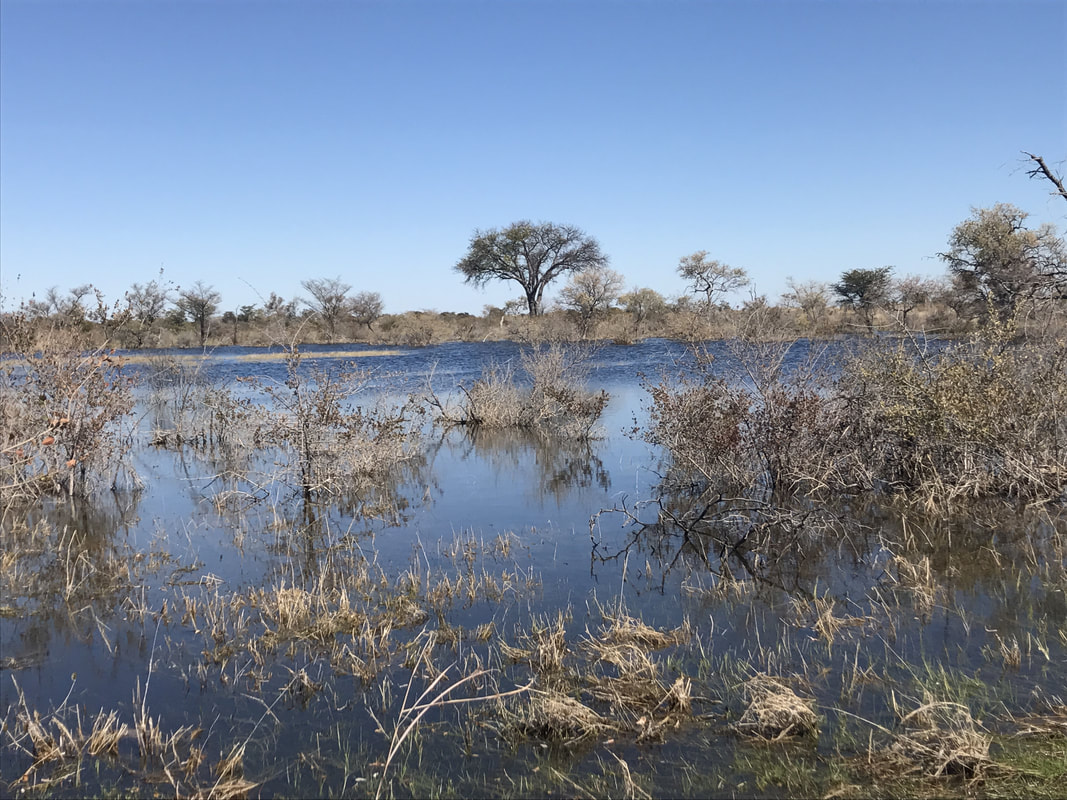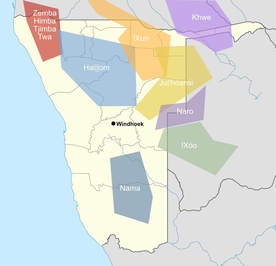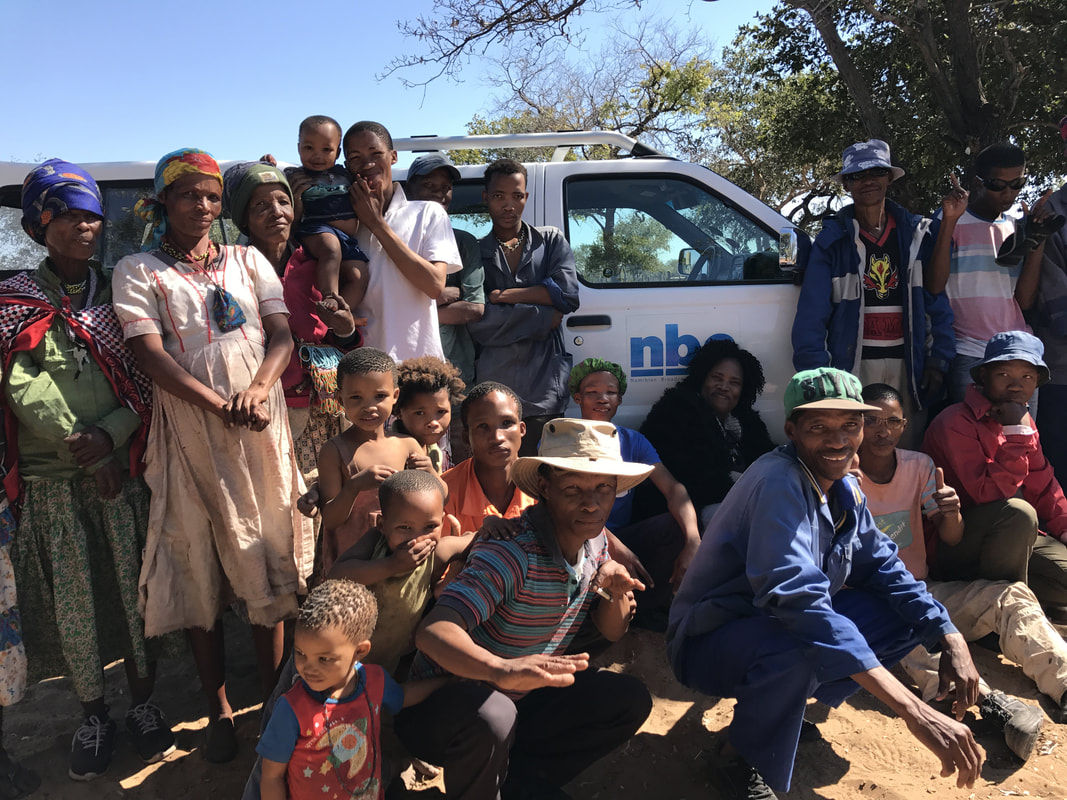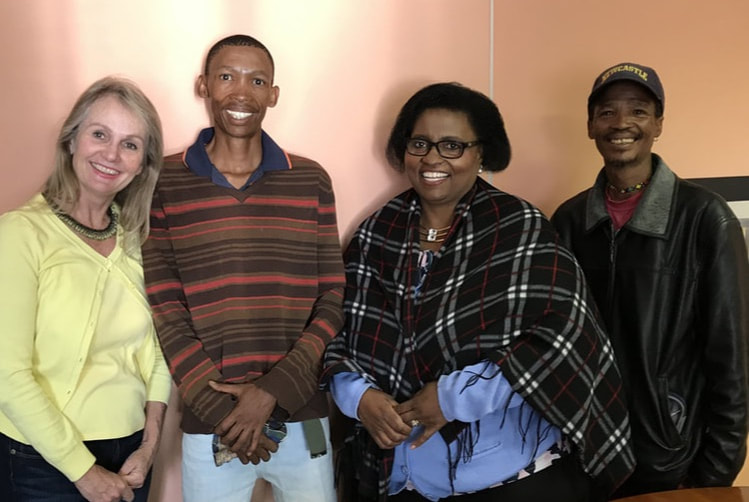|
As promised to the proposed project stakeholders, the NBC (Namibian Broadcasting Corporation) and the head of the Ju|’hoan traditional authority, Tsamkxao ǂOma, 'chief' Bobo,, we, i.e. the !Ah radio station manager, the late Teresia Mieze, interpereter and San council member, Kallie and I, have travelled north, south, east and west of the transmission tower, mostly off-road to talk to Ju|'hoan people about the idea. It’s been a shuddering, juddering, sometimes swampy three weeks (we bogged down axle-deep in mud trying to circumvent a pan of water that had obliterated the road) but it’s been encouraging. After hearing of the idea to make an on-going radio show with the Namibian Broadcasting Corporation using local talent, villagers clapped and said “we wish you could start today!” In one settlement the children chanted: ‘We are ready for the project, we are ready, we are ready!” Quick aside: in this same village, Ben se Kamp, I noticed a boy behind the squatting adults. He was grinning at me and waggling his fingers on his head. Then he flapped his folded arms at his side like wings. Of course! He’d been in the class I’d done storytelling with the previous year. He must have remembered the story they made up about a guinea fowl mother who saves her children from a hyena. I certainly did. It was a great story, a brilliant example of the collaborative learning the San are so good at. Afterwards the kids did a triumphant guineafowl dance around the tented classroom, waggling their fingers like guinea fowl coxcombs. The funding stream I’m targeting is the UNESCO International Fund for Cultural Development. However, applications only open in December 2017 and approved projects can only begin in March 2019. Sigh. We have now visited 14 of the current 37 Ju|’hoan villages and approval of the proposed idea has been universal. I’ve learned that functioning radios are in short supply and that listeners want more Ju|’hoan native speakers as announcers. I’ve also heard stories that I think will make excellent material for the drama, and I’ve met individuals who are obviously naturally talented performers. Most importantly, it’s become clear that everyone wants a chance to audition if/when we secure funding for the khuitzima. Gasp. That could be hundreds of people coming in from the outlying villages alone. And they’ll have to be housed and fed. The logistics are daunting. I discuss the problem with Melissa Heckler and Prof Bob Hitchcock. He’s co-director of the Kalahari People’s Fund. (Yes, the one I ask buyers of my novels to donate to in lieu of a purchase price.) They have a great idea – a storytelling festival, all interested parties invited, and the NBC recording performances as a way to build up a database of actors and material for the drama. Bruce Parcher, in charge of San Culture and Education for TUCSIN (The University Centre for Study in Namibia) says they can help too. Whew! “Let’s call a halt on visiting villages,“ I tell Teresia and Kallie. “You’ve got a radio station. Let’s use it to broadcast news of the khuitzima. So we did, and in the process discovered that Kallie is a pretty good announcer.
1 Comment
 Drove 800 km north out of Windhoek, no problem. Passed ostrich, baboon, warthog, lilac-breasted rollers (no fire this time – see link), bee eaters, pale chanting goshawk and some exotic road signs. Then, disaster… we stopped overnight and I locked the keys for the hire car in the boot. I was informed a spare would take one week to reach me. Impossible. Also, the courier cost was prohibitive. “Break the window, remove the seat and pay for repairs,” advised Hertz. “Ag,no, what,” said Stephan, owner of the excellent Seiderap guesthouse in Grootfontein. “Lemme have a go.” So, between cooking delicious courses and topping up guest wine glasses, Stephan popped out with a bent wire and popped the lock. I can definitely recommend that stopover! The next afternoon we — I was with my trusty Kalahari travelling companion, Melissa Heckler, founding teacher of the Village Schools in Nyae Nyae. She was returning to expand the pre-school education project she’s started — drove into Tsumkwe, home to !Ah radio. With a floating population of approximately 1500, it’s the largest town in the arid Nyae Nye Conservancy. Amazingly, Tsumkwe looked like it had been plopped down into the Lake District. Green shrubs, green grass, large bodies of blue water, where before there’d been parched earth and bushes grey with dust. Coot and teal hooted and quacked as we drove over a section of road that was now a bridge. I spotted a turtle clambering up the trunk of a submerged tree. Where the heck had it been during the drought years? Next morning I called in at the NBC, was welcomed warmly, and immediately we were off to find the head of the traditional authority in the region, a man known affectionately as "Chief" Bobo. The chief was not in his usual abode. “He’s gone Bushmen,” his son, #Oma Leon quipped. He explained his father was out harvesting Kamaku, Devil’s Claw, a root sold to big pharma for use in countless health products. Kamaku is hell to harvest. The tell tale surface tendril is difficult to spot, and handling the prickly bulb lacerates the fingers. As natural ecologists, some say the world’s oldest, the Ju|’hoansi ensure the mother plant is left intact to grow next year’s crop. Digging Devil’s Claw is seasonal work and poorly paid, but it’s one of the few sources of income for many residents of the area. After a lot of off-road driving, we came upon four OAPS who were clearly in their happy place, a peaceful bush camp under lacy trees. The old wives sat under on the ground, legs outstretched, chatting and laughing as they sliced the murderous root. The chief’s brother-in-law whittled away at a new walking stick, fashioning a head of white much like his own. Tsamkxao ǂOma, Chief Bobo, received us graciously. To paraphrase the translation made for me: "He is thanking us for driving out to find him." Chief Bobo listened keenly as my interpreter outlined the project, then beaming through over-large blue plastic spectacles, he launched into a statesmanlike speech: “This khuitzima (lit. radio role play) is a very good opportunity for the Ju|’hoan to present their culture and talent to other people in Namibia, and even beyond Namibia. People must realize this work is long-term; it’s a project not just for them but for their children too....” Translation provided by Kallie N!ani Kagece of the Tribal Authority office 'Chief' Bobo asked me to visit as many Ju|’hoan villages as possible to get the approval and input of the people. Consensus is the San way. I agreed, little knowing how many there were and how arduous travel conditions would be over the next few weeks, in the soggy Kalahari desert. “We’ll translate it into other languages and broadcast across Namibia. And ... make a TV show too. Everyone must see what the San can do.”  San language group distribution, Namibia & surrounds. San language group distribution, Namibia & surrounds. Do you remember that idea I had for an educational radio drama to be made for Ju|’hoan listeners in conjunction with the Namibian Broadcasting Corporation (NBC)? Well, my employer, the University of Wolverhampton, thought the idea good enough to invest in, so they sponsored a fact-finding mission to establish stakeholder interest in the proposal. I was also to secure the necessary permissions prior to applying for external funding for the project. I began my trip in Windhoek, capital city of Namibia, where I was invited by my future bid partner, Ms Menesia Muinjo, to her management meeting to present the idea. Menesia is the charming Head of News and Programming. Effortlessly she combines the roles of boss, friend and mother, motivating a team to produce daily broadcasts across 10 radio stations and 3 television channels, sometimes for up to 18 hours a day, despite very limited resources – i.e. untrained staff, outdated equipment and a budget most BBC execs. wouldn’t get out of bed for. The NBC are fired up about making a radio drama using the talents of local Ju|’hoan speakers and have a far-reaching vision for it. “We’ll translate it into other languages and broadcast across Namibia. And our DG [NBC Director General, Mr Similo] wants us to make a TV show too. Everyone must see what the San can do,” Menesia bubbled. We began gathering approval for the idea from stakeholders and their representatives. Menesia had a hotline to the musically named, Hon. Royal /Ui/o/oo, Deputy Minister of Marginalized Communities in Namibia. (Suck your teeth for the first syllable, then make a champagne cork-popping sound twice, for the next two. Cha-cha for the tongue.) He enthused at length and segued into requesting a drama for every San group. (You may recall that the Ju|’hoan are one of several groups of click-language speakers still found in Namibia.) Meanwhile I visited Kileni Fernandu, secretary of the newly formed San Council of Namibia. I felt apprehensive; she has a reputation as fierce guardian of San rights. No doubt she is, but also extremely courteous, (I’ve never felt as closely listened to as I did by this young woman) warm and helpful. Can't wait to share koeksusters with her again. Next, a meeting with the Director of Adult Literacy in Namibia, Mr Beans (yes, really!) Ngatjiseko and his team, about dovetailing the drama with the Adult Literacy curriculum and literacy promoters in the province of Otjozondjupa in some way, when the time comes. Fine in theory, but they too operate under severe budget constraints in a country where government spending is being curbed. Finally, it was time to take my idea to the people of Nyae Nyae. Menesia put the NBC’s four-wheel truck and off-road driver, the station manager of !Ah radio herself, at my disposal in Nyae Nyae. All I had to do now was get there. |
AuthorAfrican novelist and out-to-grass, academic. Archives
January 2024
Categories
All
|


 RSS Feed
RSS Feed